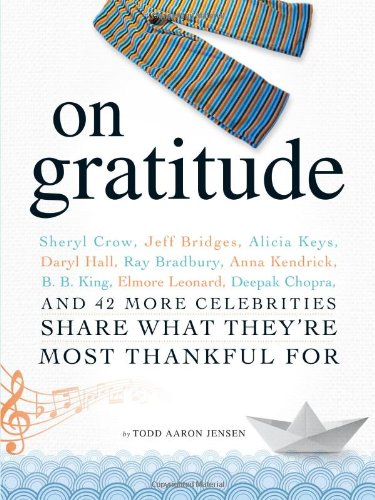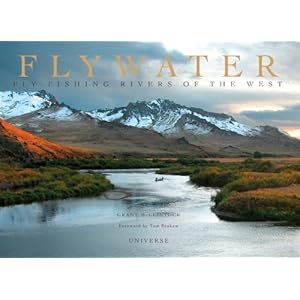What inspired you to put this collection together and how'd you go about getting all these celebrities to participate?
Being human, I enjoy the same joys and calamities that we all do. Like most people, I clung desperately to the joys, the things I thought I’d figured out, knew for sure, and would enjoy forever. And then, the wheels fell off the wagon of the cart in really grand fashion. Life became a sad country-western song. My response: moping, counting the lack, tallying the loss. A wonderful friend of mine, Lorelei Butters, was there for me in those dark hours and said, “No matter what you’ve lost, you’re still the richest man I know.” I agreed with her – after arguing the point for about six months. And then I really embraced what she said and came to this realization: “Life’s blessings were always there; I wasn’t.” Once I started being fully present and fully engaged in the present moment, I started seeing and hearing and feeling life in different ways. I’ve worked as a journalist for almost 20 years, but even the work started happening in different ways. On Gratitude is the result of a very blessed man who, slow learner that he is, finally caught up with the idea of truly giving thanks. All that’s required, really, is to shut up and listen; that’s when the most beautiful stuff happens.
As to how I got all the celebrities to participate, the simple answer is: I asked. Used to being caught in the crosshairs of paparazzi or engaged on a purely commercial level – they’re selling a movie and we’re selling ad pages, for example – I think many of the celebrities quite enjoyed the opportunity to really speak from the heart. The songs they sing in On Gratitude are profound and moving, silly and sacred. Each conversation was a blessing.
Which tale of gratitude in this book was most touching to you?
This is a little like asking me to choose my favorite egg from the omelet. I will say that Samuel L. Jackson’s candid stories about finally walking through the “right” doors after years of loitering in darkness moved me very much, as did Sheryl Crow’s gratitude for not only surviving breast cancer but for how the diagnosis itself stopped her mind and corrected her course. Ray Bradbury’s declaration that “love is the answer to everything” is also something by which I firmly abide. But I’ll never forget interviewing Alicia Keys the day before the book was due to my publisher. Miss Keys has a very busy schedule and, as a father of six and a yoga teacher, a youth baseball coach and a freelance journalist, so do I. The only time we could make the interview work was right in the middle of a big game for my 8-year old son’s baseball team, which I coach. In the middle of the fourth inning, I snuck off to my minivan, hit record, made the international call, and had the most exhilarating, illuminating, intimate conversation imaginable. That woman is the personification of grace. And in the distance, my son played ball with joy and ferocity. Not much better than that, really.
Do you think society is becoming more grateful or less grateful?
I’ve no way to measure that in any scientific way, but I can say the world around me is becoming more grateful. If like attracts like as so many spiritual leaders currently suggest, I can say my life story supports that. The love that you take is equal to the love that you make. I am well-loved by some very wonderful, grateful people – my parents, my friends, my wife – and so I’m inclined to tell you that society is becoming more grateful. I can also tell you that there are some folks much smarter and cooler than I, scientists at UC Berkeley and UC Davis, doing amazing research about why gratitude matters and how even a casual gratitude practice – keeping a short journal just a couple of times a week for a few months – leads to great increases in one’s physical, emotional, and spiritual health and happiness. (Check Dr. Robert A. Emmons’ amazing book, Thanks! How the Science of Gratitude Can Make You Happier, for more on that). If you’re unsure how to start or maintain a gratitude list, I’ve written a blog about it on my website:
http://www.thegratitudelist.org/index2.php?v=v1#/info2/1/
http://www.thegratitudelist.org/index2.php?v=v1#/info2/1/
How can having more gratitude in your life improve it?
If you count the things you’re missing or that you’ve lost, then you’re living with what you don’t have. If you count what you’ve got, even if the list is as modest as “this heart that beats, this pen I’m holding, this opportunity to try,” you’re immediately in a different and better place. And one of the keys to living gratefully I’ve found – a sentiment echoed by Alicia Keys, Forest Whitaker, Jeff Bridges, and countless others in On Gratitude – is to give. There is no shortage of human beings on this planet who have much less than you do, much sadder stories than you do, whose most fundamental needs are not close to being filled. Find those people. Connect with organizations that honor those people. Volunteer. Serve. In your giving, you become grace and that, very naturally, leads to gratitude.
What are you most grateful for?
The list is ever-evolving. At the moment, I’m grateful for the relationships in my life, which bring me incredible joy and, also always, the opportunity to grow, to push past my own edges, to become more than I was. I’m grateful for my good health, which was significantly challenged earlier this year. I’m grateful for the Marx Brothers, who remind me constantly that silly and sacred may be strange bedfellows, but always share a pillow. I’m grateful for the amazing community that this book has invited into my life and continues to expand. I’m grateful for the opportunity to teach, a gift of which I am very mindful. (I believe we are all teachers, whether we mean to be or not, which is why self-awareness is a journey always worth taking). I’m grateful for the poetry of cummings and the jazz piano of Mehldau and the sketches of my 8-year old and the embrace of my wife and the wild intelligence of my 12-year old and I’ll never get tired of watching the waves. Also, I love crème brulee.
Website: <
http://www.thegratitudelist.org/>
Facebook: ONGRATITUDE
Twitter: @ON_GRATITUDE
Trailer: <
http://www.youtube.com/user/ONGRATITUDE>
Amazon: <
http://www.amazon.com/Gratitude-Bradbury-Kendrick-Celebrities-Thankful/dp/1440505942/ref=sr_1_cc_1?ie=UTF8&qid=1288017679&sr=1-1-catcorr>


